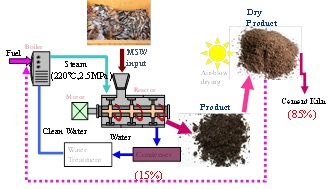
Kunio Yoshikawa
Tokyo Institute of Technology, Japan
Title: Solid fuel production from non-segregated municipal solid wastes employing the hydrothermal treatment
Biography
Biography: Kunio Yoshikawa
Abstract
Up to now, the only commercialized ways of municipal solid waste (MSW) treatment are mass land-filling and mass burning. In Japan, most of burnable wastes are incinerated, but not in other countries, and still land-filling is the most popular way of waste treatment all over the world. But the world recent trend is to prohibit or limit land-filling of wastes while citizens do not want to increase waste incineration in developed countries as well as developing countries. On the other hand, major part of the world is discharging non-segregated municipal solid wastes. Thus we have to find out the utilization ways alternative to incineration for non-segregated MSW. Pre-treatment of wastes requires crushing, drying and deodorizing, which are normally different processes. But we have developed innovative hydrothermal treatment technology (HTT) which can perform these three pre-treatment functions in one process utilizing high pressure saturated steam. Figure 1 shows the operating principle of HTT. Non-segregated MSW are fed into the reactor, and then, 220℃, 2.5MPa saturated steam is supplied into the reactor for about 30 minutes and the blades installed inside the reactor rotates to mix MSW and steam for about 10 minutes. Then the product is discharged after extracting steam. The product is powder-like substance and the moisture content is almost the same as the raw material, but is easily dried by natural drying. The inert material such as metal, glass and stones can be easily sieved out after drying. There is almost no bad smell in the solid products, and the products can be used as solid fuels which can be easily mixed with coal for power generation or cement production. Only 10-15% of the product is enough for steam production in a boiler. HTT has already commercialized in Japan, China and Indonesia.


